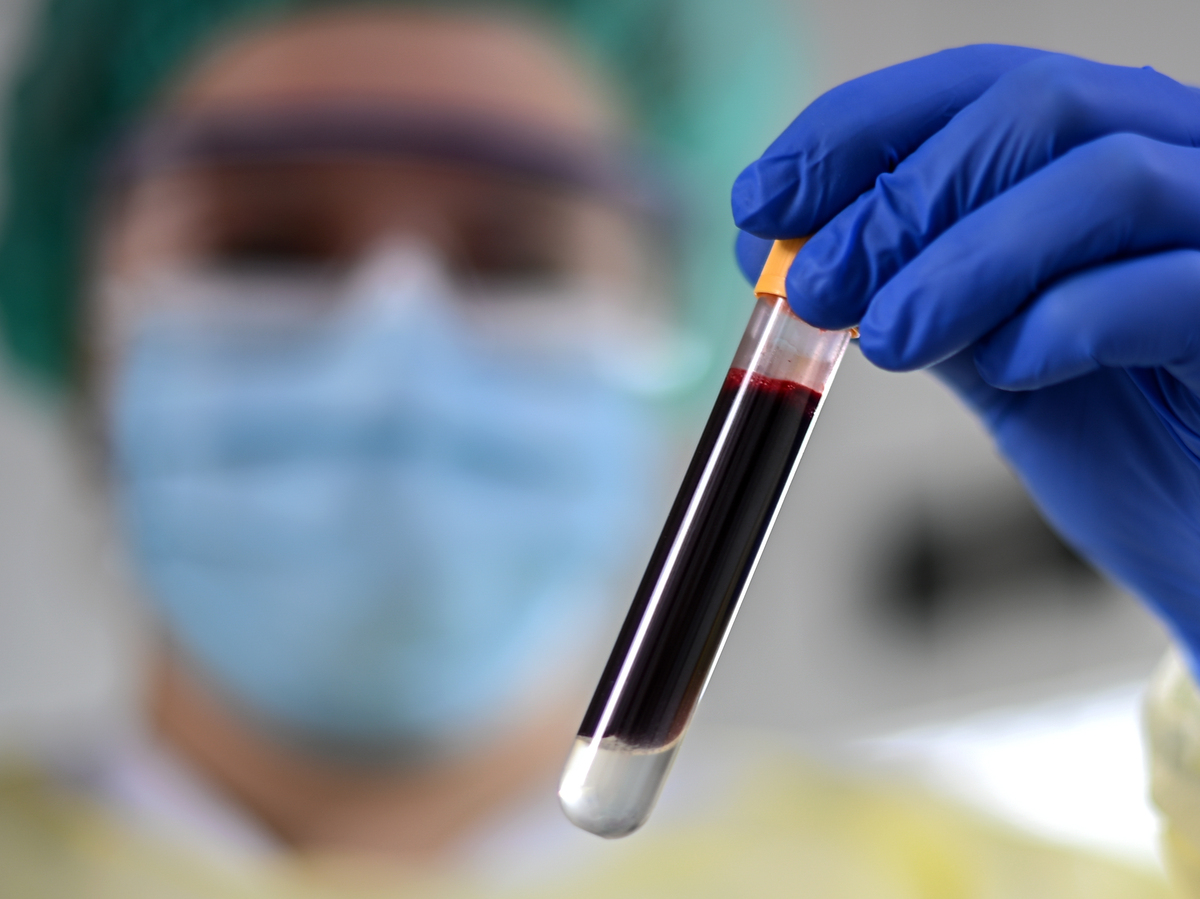
Scientists have studied the blood of people who were part of a large trial for the Moderna vaccine to measures antibodies that can help predict levels of immunity after getting a COVID shot.
Britta Pedersen/dpa/picture alliance via Getty I
hide caption
toggle caption
Britta Pedersen/dpa/picture alliance via Getty I

Scientists have studied the blood of people who were part of a large trial for the Moderna vaccine to measures antibodies that can help predict levels of immunity after getting a COVID shot.
Britta Pedersen/dpa/picture alliance via Getty I
When Dr. Anthony Fauci spoke recently at a White House briefing about the need for COVID-19 booster shots, buried in his slide show of charts and data points was a little-noticed scientific paper that offers evidence for a reliable way to predict how much protection a COVID-19 vaccine offers.
The study appeared on a preprint server earlier this month without much fanfare, but many interested in the future of COVID-19 vaccines had been eagerly awaiting the results.
The researchers were looking for markers in vaccinated patients’ blood that would indicate protection against COVID-19, what’s known as ‘correlates of immunity.’ What the team of scientists found were neutralizing antibodies — proteins made by the immune system that are known to disarm the coronavirus.
As Fauci explained, the paper showed that higher levels of these antibodies are associated with higher levels of vaccine efficacy. The findings suggest that giving people a booster vaccine, which has been shown to raise antibody levels, would go a long way toward protecting them against the coronavirus, including some of the newer and more dangerous variants.
While more studies are needed to confirm the findings, discovering that these markers correlate with immune protection has implications for future COVID-19 vaccine research. It means that researchers now can measure whether a new COVID-19 vaccine might work — without necessarily having to repeat large-scale efficacy studies.
“That could be used as the basis for authorization and approval of vaccine candidates without needing to do these trials with 40,000 people that take a long time and a lot of expense to complete,” says Peter Gilbert a biostatistician with the Fred Hutchinson Cancer Research Center, the lead author on the new study.
Why we need correlates of immunity
To understand if there is a protective level of neutralizing antibodies, a team of researchers from academic institutions, industry and the government did new research on the blood of people who participated in the large trial of the Moderna vaccine. That older trial, involving 30,000 volunteers, was the basis for the Food and Drug Administration granting Moderna emergency use authorization for its COVID-19 vaccine.
This new research found 46 people in the Moderna study who had been vaccinated, but subsequently got sick with COVID and compared their levels of neutralizing antibodies with the levels found in a sample of 1,000 people who were vaccinated during the trial and never got sick.
“[The antibody levels] were always lower in the vaccinated people who became a COVID case compared to people who remained free of COVID,” Gilbert says.
The results show that antibody levels can be predictive of immunity, which should help develop and test new vaccines at a much faster pace. It’s even possible COVID-19 vaccine makers may not need to conduct trials with huge numbers of people to see how many get sick after getting vaccinated. Instead, researchers could simply draw blood and look for antibody levels that correlate with protection.
“So maybe they would only need to study a couple of hundred people instead of tens of thousands if they wanted to show a vaccine was working,” Gilbert says.
No magic number yet
The four markers of immunity identified in the paper should indicate how well a COVID vaccine is working overall, but the blood test cannot tell an individual person about their level of protection.
It would be great if the antibody level was a specific number, but it’s not, says Emory University biostatistician David Benkeser, another author on the study.
“Unfortunately, the story is a bit more subtle than that,” he says. “We really view this as more of a continuum. Some antibodies [are] good. More are better.”
In fact, it’s pretty clear that antibodies alone don’t explain why some people are protected, and other parts of the immune system also play important roles in fighting off the coronavirus, including T-cells.
“Two percent of the individuals who were vaccinated had very, very low levels, levels of antibodies that were below that lower limit of detection,” says Christopher Houchens, a biomedical researcher at the Biomedical Advanced Research and Development Authority, another author of the study. “However, about 50 percent of those individuals in that two percent of the population were still protected and did not come down with symptomatic COVID-19 disease.”
More research needed to convince federal regulators
Researchers plan to do a similar analysis of the association between antibodies and vaccine-induced immunity in people who participated in the Johnson & Johnson and AstraZeneca COVID-vaccine trials to see if the same pattern holds.
There are also plans to collect data in what are called challenge studies, where vaccinated people are deliberately infected with the coronavirus to see how well the vaccine protects them from infection or illness.
Ultimately, multiple studies will be needed to convince federal regulators that antibody levels alone can be sufficient evidence to support authorization and approval of a future COVID vaccine.
That’s not a surprise.
“Science is not simple,” says Holly Janes, a biostatistician at the Fred Hutchinson Cancer Research Center who worked on designing the antibody study. “It’s not clean and tidy. Looking at things in different ways, in different types of studies, different types of analyses and different data sources is important, and that’s how we get at the truth. There’s hardly ever one study that tells us everything we need to know.”


